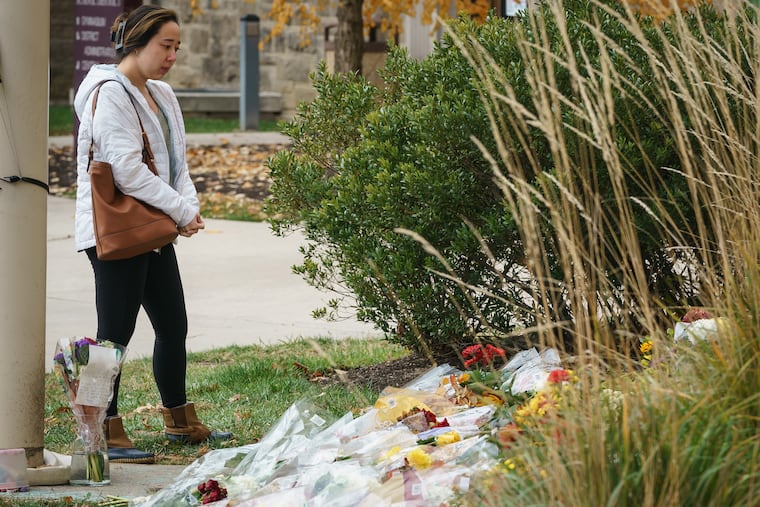How to help Lower Merion students mourn the loss of principal killed in car crash | Opinion
Adults have an important responsibility to help the young people in Lower Merion find ways to productively deal with their grief.

Sean Hughes, the beloved principal of Lower Merion High School for over 14 years, tragically and shockingly lost his life in a car accident this weekend. According to district leaders, Mr. Hughes — as we all called him — was driving his son to a soccer game when the crash occurred.
As soon as the community learned of Mr. Hughes’ death, Lower Merion High School students, alumni, and parents found ways to come together to mourn. Many people recalled his famous mantra that “character counts.”
Families are trying to digest the shock. Mr. Hughes’ death is a moment when parents, students, and educators have to ask themselves: How do we move forward when we feel like our world has been turned upside down?
As a trauma specialist and a parent of a Lower Merion student, I’ve heard from many parents in recent days. One told me his daughter, a 2021 graduate, began sobbing and became distraught upon hearing the news. Others have asked me, “How do we explain the news to our children and reassure them that it is still safe to drive in a vehicle?”
When the shock and disbelief of someone’s death becomes a reality, the pain and mourning begins. This kind of loss shakes people’s sense of security. It is crucial that people — especially students at Mr. Hughes’ school, who may be experiencing their first big loss — share their thoughts and feelings. Adults, especially, have an important responsibility to help the young people in Lower Merion find ways to productively deal with their grief.
» READ MORE: Sean Hughes, principal of Lower Merion High School, died in a car crash Saturday
It is normal for people of all ages to feel denial and disbelief when someone dies so tragically. Expressing thoughts like, “How could this happen?” is part of what helps people begin processing and grieving for a life that cannot be saved.
There are many steps communities and families can take when they begin to pick up the pieces after a sudden loss.
Coming together as a community offers comfort and relief. Finding ways to honor the person’s memory also helps people feel like this person will never be forgotten. Shortly after the news broke, someone circulated a petition asking for the Lower Merion middle school to be named after Mr. Hughes.
Setting up bereavement groups and offering outlets for anyone affected by the loss can help young people live with their pain and grief. Life does not go back to normal after this kind of trauma. Rather, people need to find ways to integrate the tragedy and their emotions as part of their lives as they cope. Writing letters to the bereaved family of Mr. Hughes, or setting up healing circles and vigils throughout the year, keeps the conversation going.
It is important for communities to set up ongoing support, instead of just having crisis intervention the week the tragedy occurs. Grief comes and goes, and with the holidays just a week away, the idea of loss may hit some people even harder. Everyone processes the sudden loss of a loved one in a different way. On many occasions, the reality of the person’s absence can take weeks or even months to feel real. Having places for people to get support and talk about their feelings as they emerge can prevent long-term mental health conditions, such as post-traumatic stress disorder and depression.
Taking the heartbreak and finding ways to connect with others affected by that particular person’s loss enables people to continue moving forward. Students and staff of Lower Merion High School will walk back into the building this week while grappling with their grief and disbelief. Sometimes just putting one foot in front of the other and connecting with another human being can make a difference.
There is no way to know how Mr. Hughes’ death will affect the Lower Merion community long term. Grief is not predictable. At times, the pain will feel intolerable, especially for those closest to him. There is no right way to handle this kind of experience. It is most important that people keep talking about whatever they are feeling. Sometimes people just need to have someone listen to them without trying to fix it or make it better.
It is possible to live after a sudden loss, but it takes time, caring, and an abundance of support within the community.
Shari Botwin is a licensed clinical social worker and author of “Thriving After Trauma: Stories of Living and Healing.” She has been counseling men and women in recovery from trauma and abuse for over 24 years in her Cherry Hill private practice.